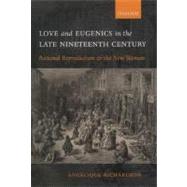
Note: Supplemental materials are not guaranteed with Rental or Used book purchases.
Purchase Benefits
What is included with this book?
| List of Illustrations | xi | ||
| Prologue | xvii | ||
| 1. Introduction | 1 | (32) | |
| 2. Women and Nature | 33 | (25) | |
| 3. Charity and Citizenship | 58 | (20) | |
| 4. Science and Love | 78 | (17) | |
| 5. Sarah Grand and Eugenic Love | 95 | (37) | |
| 6. Sarah Grand, the Country, and the City | 132 | (24) | |
| 7. George Egerton and Eugenic Morality | 156 | (23) | |
| 8. Mona Caird: Individual Liberty and the Challenge to Eugenics | 179 | (36) | |
| Afterword | 215 | (13) | |
| Select Bibliography | 228 | (11) | |
| Index | 239 |
The New copy of this book will include any supplemental materials advertised. Please check the title of the book to determine if it should include any access cards, study guides, lab manuals, CDs, etc.
The Used, Rental and eBook copies of this book are not guaranteed to include any supplemental materials. Typically, only the book itself is included. This is true even if the title states it includes any access cards, study guides, lab manuals, CDs, etc.